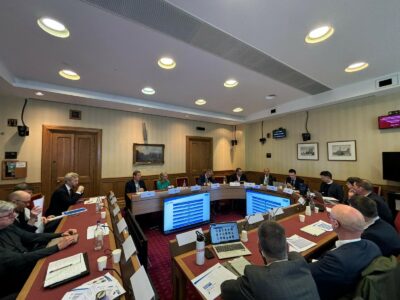
Green Growth
Apr 29 2024
This week sees the launch of the Midlands Energy Security Taskforce, signifying a commitment to harness the Midlands’ energy potential for the benefit of both the region and the country.
Read more
A new report from the Midlands Engine has put forward a plan for the Midlands to become the UK’s first Smart Energy Region, helping tackle both the cost-of-living crisis and climate change.
The report, Smart Energy – An Energy System for the 21st Century, was co-authored by the Midlands Engine partnership, Siemens, the University of Birmingham and the Energy Research Accelerator. It calls for the accelerated digitisation of regional energy systems to usher in significant domestic energy savings, job creation, and support for the continued rollout of cheap, clean energy sources.
Smart energy systems can include ‘microgrids’, electric vehicles and smart meters, and would use digital technologies and artificial intelligence to balance energy needs across a network.
In the case of the Midlands, the report identifies opportunities for consumers and businesses to save up to £70bn in energy costs, while slashing hundreds of thousands of tonnes of CO2 emissions and establishing the region as a world leader in smart energy.
This month the National Grid began trialling a scheme using smart meters to help customers access discounts by using less electricity at peak time. The Smart Energy report identifies opportunities for similar schemes for small businesses and electric vehicle charging and highlights ways in which interconnectivity and use of data can drive even greater efficiencies.
It calls for a number of initial steps to set the region on the right path, including the rollout of large-scale Smart Energy Pathfinder projects, the creation of a regional energy data taskforce, and the formation of a smart energy skills programme. It highlights the need for public sector support for decentralised energy systems, especially through more local renewable energy generation.
These steps would follow a number of regional smart energy projects that are already underway, including the University of Birmingham’s smart campus plan. Combined with the region’s scale of energy utilisation (the Midlands accounts for a sixth of Britain’s electricity and gas demand) and its ambition to reach net zero, the report says the region could become a smart energy exemplar.
Lord Bilimoria, Chancellor of the University of Birmingham and President of the Confederation of British Industry, said of the report:
“The UK energy system is changing at an unprecedented pace. The ongoing energy crisis has shown how crucial it is that we secure a robust domestic supply of cheap energy, as well as reinforce our commitment to net zero emissions by 2050.
“Smart energy systems are a crucial step on the way to achieving these aims, while providing regional growth and supporting high-skilled jobs. It’s fantastic to see the Midlands leading the way in their development, with the University of Birmingham, Siemens and the Midlands Engine combining their expertise to make potentially transformative policy recommendations.”
Sir John Peace, Chairman of the Midlands Engine partnership, said:
“The Midlands Engine partnership is committed to growing our region’s economy while ensuring a net zero transition for the next generation. The exceptional work of partners to lay the groundwork for smart energy, combined with our world-leading research and manufacturing base, means we are well placed to build on our history of powering the UK by driving forward the implementation of smart energy systems.
“Smart technologies will also make an immediate impact, enabling users to better manage energy demand at a time of high inflation.”
A focus on smart energy follows numerous recent advancements in the green growth sector in the Midlands. The region was recently chosen to host the West Burton STEP fusion project and has been moving forward with its plans for a hydrogen technologies valley. These are all underpinned by the Midlands Engine’s ten-point plan for green growth, which has set out a roadmap for a 36% reduction in CO2 emissions from 2020 levels, while generating £24.2 billion GVA for the region’s economy by 2041.
The Midlands Engine’s report – Midlands Smart Energy: Review and Future Possibilities, is available here https://bit.ly/3WD1UIm

Green Growth
Apr 29 2024
This week sees the launch of the Midlands Energy Security Taskforce, signifying a commitment to harness the Midlands’ energy potential for the benefit of both the region and the country.
Read more
Transport
Apr 25 2024
Birmingham Airport (BHX) has achieved Level 3 (optimisation) of the Airport Carbon Accreditation (ACA) scheme for a second year.
Read more
Global
Apr 24 2024
World-leading materials science and technology consultancy Lucideon is targeting international growth with expansion in the Japanese market.
Read more